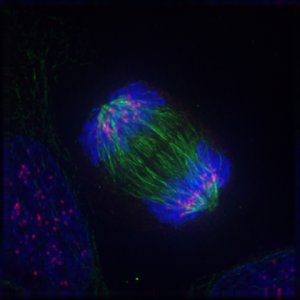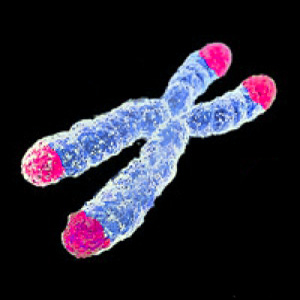Part 5: Telomere therapies against aging

Telomeres and aging: therapies
Telomeres are regions of DNA found at each end of chromosomes. They are synthesized by an enzyme, telomerase [1]. If we look at the issue of telomeres in the fight against aging, it is because a correlation has been found between the shortening of telomeres and the aging of the body. This shortening occurs during cell division, but many other factors come into play and can also accelerate it (sex, stress, tobacco, alcohol, excess weight, etc.).
The length of telomeres therefore constitutes an interesting avenue for developing therapies to combat aging. We can cite the example of Elizabeth Parrish, CEO of Bioviva, a biotechnology company in the United States; she tested on herself a gene therapy developed by her own laboratory, a therapy which aims to lengthen her telomeres in order to “rejuvenate” [2]. Even though an elongation of her telomeres was observed and she claims that her cells have “rejuvenated by 20 years”, the scientific community is skeptical on this subject, because no scientific articles or preclinical studies had been carried out. about this therapy before she administers it to herself.

No therapy has yet proven its effectiveness in combating the shortening of telomeres and thus extending human life expectancy, but a few studies have already been carried out and modes of action make it possible to extend lifespan and to improve health, by directly targeting telomeres.
An anti-aging gene therapy treating telomerase and working in mice
Experiments were therefore carried out on mice by researchers in Spain, in order to increase their lifespans as well as their state of health during aging [3].

The aim of this experiment was to treat adult (1 year old) and aged (2 year old) mice by injecting them with a virus (AAV) capable of synthesizing mouse telomerase via the TERT ( telomerase reverse transcriptase ) protein. Their lifespan and general health were then compared to those of healthy mice of the same age. The results showed that the treated mice showed improvements in their general health and physical fitness compared to the control mice, as well as a longer lifespan than in the control mice (+24% for the mice). 1 year, and +13% for 2 year old mice), all this without observing any greater formation of tumors or cancer cells (an excess of telomerase can be responsible for excessive cell division and therefore creation of tumors/cancer cells) [3].
These results therefore make it possible to prove that in mice, this therapy acting on telomerase makes it possible to extend lifespan while improving living conditions. It would therefore constitute an effective anti-aging therapy in mice, and potentially effective in other mammals, or even humans in the future.
Lifestyles help fight against telomere shortening and aging
Even if no therapy has yet been demonstrated to be effective in humans, certain behaviors and lifestyles can prevent telomere shortening. According to a study led by Masood A. Shammas, a researcher at the Cancer Institute in Boston, much evidence tends to confirm that lifestyles influence health and life expectancy by directly affecting the length of telomeres [4]. Here, according to his study, are some factors that can influence health and life expectancy by shortening telomeres, and therefore what reflexes to modify or adopt in order to fight against this shortening.
Overweight and obesity cause an increase in oxidative stress, due to dysregulated production of adipocytokines and the production of oxidizing agents in adipose tissues. Since oxidative stress can cause DNA damage, it is very likely that it causes the shortening of telomeres, which leads to a large reduction in life expectancy, of around 8.8 years [4].
You should also change your diet in several ways: First of all, eating less has an “anti-aging” effect. Thanks to experiments on rats, it has been proven that caloric restriction helps reduce oxidative stress, and therefore DNA damage, but also lowers growth hormone levels, which allows you to stay healthy. longer at a “young” age and increase life expectancy by up to 66% by limiting foods rich in proteins and oxidants [4].
Eating foods rich in antioxidants helps prevent telomere reduction. Indeed, according to a study, eating foods rich in antioxidants, such as fatty acids rich in Omega 3, is associated with a reduction in the shortening of telomeres: the level of fatty acids rich in Omega 3 in the blood was measured for 5 years in adults, by measuring the length of their telomeres in parallel. After 5 years, a correlation was noted between having a high level of these fatty acids and having longer telomeres [4].
Finally, the consumption of fiber should be favored, compared to fats and proteins. Also through experiments on rats, telomere length was positively correlated with a diet high in fiber, but negatively correlated with a diet high in protein or fat (reducing protein content by 40% in the feeding rats even allowed an increase in life expectancy of 15%, and an increase in the size of telomeres in the liver) [4].
Smoking accelerates the shortening of telomeres and aging: smoking an average of one pack of cigarettes per day corresponds to the loss of length of approximately 25.7 to 27.7 bp per year, due to considerable increase in oxidative stress caused by tobacco. In 40 years, this figure would correspond to 7.4 years of lost life expectancy. It is therefore important to reduce its consumption, or even stop it, in order to limit the loss of telomeric DNA and slow down aging, or to adopt anti-oxidative therapy to reduce oxidative stress [4].

Stress directly influences the size of telomeres: Stress causes a release of hormones that block the body's antioxidant proteins, and therefore increases oxidative stress, which induces the shortening of telomeres and a drop in telomerase activity. Stress could be responsible for a loss of life expectancy of up to 10 years. It is therefore also essential to pay attention to external stress and one's living conditions in order to fight against aging [4].
It is thus possible to preserve your telomeres by changing your lifestyle.
Even if no gene therapy has yet scientifically proven its effectiveness in humans, there seem to be promising avenues in this area and all that is missing is real scientific and preclinical studies in order to adapt them, and that it would be important to see happen soon given the importance of these discoveries and the subject.
Nevertheless, there is other causes of aging on which it is still necessary to work before arriving at effective therapies to completely combat aging.
SOURCES:
Katidja Allaoui on http://www.longlonglife.org/
Sources:
[1] Chatterjee, S. (2017). Telomeres in health and disease. Journal of oral and maxillofacial pathology: JOMFP, 21(1), 87.
[2] Blasco, M.A. (2007). Telomere length, stem cells and aging. Nature chemical biology, 3(10), 640-649.
[3] Leri, A., Franco, S., Zacheo, A., Barlucchi, L., Chimenti, S., Limana, F., … & Blasco, MA (2003). Ablation of telomerase and telomere loss leads to cardiac dilatation and heart failure associated with p53 upregulation. The EMBO journal, 22(1), 131-139.
[4] Cawthon, RM, Smith, KR, O'Brien, E., Sivatchenko, A., & Kerber, RA (2003). Association between telomere length in blood and mortality in people aged 60 years or older. The Lancet, 361(9355), 393-395.
[5] Canela, A., Vera, E., Klatt, P. & Blasco, MA High-thoughput telomere length quantification by FISH and its application to human population studies. Proc. Natl. Acad. Sci. USA 104, 5300–5305 (2007).
[6] Teyssier, JR, Ragot, S., Donzel, A., & Chauvet-Gelinier, JC (2010). Telomere length in the cortex of patients with depressive disorders. L’Encephale, 36(6), 491-494.


